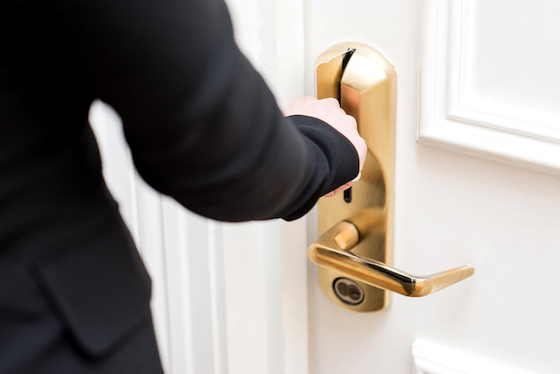Having pledged to provide employees with security devices, or so-called panic buttons, hotel managers face the complex challenge of actually rolling it out to thousands of diverse properties — from urban high-rises and select-service venues to rambling resorts.
It also involves choosing a technology partner from a fragmented field of vendors, settling on the technology that can be introduced on a large scale and training staff. Some will need to invest in Wi-Fi upgrades to ensure GPS can track a call accurately.
Earlier this month, the American Hotel & Lodging Association along with Hilton, Hyatt, IHG, Marriott and Wyndham, pledged to provide employees across the U.S. with panic buttons or alarms by 2020. Leading hotel brands have experience with the safety devices, having deployed them in markets where they are mandated by union contracts or city ordinance, including New York, Chicago, Washington, D.C., and Seattle.
“Our housekeepers feel good about the devices — they don’t feel alone in the hotel room,” said Erika Alexander, chief lodging services officer for the Americas at Marriott International, which completed a Chicago rollout in July as mandated by a 2017 city ordinance.
One initial hurdle: There aren’t enough suppliers. Equipping housekeepers with safety devices is a relatively new practice, adopted after the sensational 2011 arrest of French financier Dominique Strauss-Kahn on a sexual harassment charge. Unite Here, the union that represents workers in the hotel and gambling industries, pushed for adoption through union contracts and city ordinances.
Until now, hotel needs have been filled by a field of relatively small technology or security firms, hospitality executives said. With the announcement of national rollouts and the prospect of big-money contracts, suppliers are scrambling to serve the demand. New players are getting into the business.
“The markets are reacting to the potential opportunity,” said Michael Murray, chief operating officer of Hersha Hospitality Management, which manages 125 hotels nationwide for the major brands. He envisions a flurry of mergers and acquisitions with a handful of larger firms emerging with recognizable names.
Marriott has issued requests for proposals and is vetting the capabilities of potential partners to ramp up for some of its 5,000 hotels under 30 brands. “We’re casting a wide net,” Alexander said. Marriott expects to narrow its search by early November.
Beyond a whistle
Meanwhile, low- and high-tech approaches are being explored.
Hyatt in 2017 mandated that a loud whistle or shrieking device be provided to any associate that enters guestrooms. Some type of security device is being used at 120 managed, full-service Hyatt hotels in 12 countries covering 4,500 room attendants, a company spokeswoman said. They are in use at half of franchised hotels in the Americas.
Hyatt uses GPS-based devices in cities such as Chicago where they are required. “Safety buttons are meaningless unless they are GPS-enabled and a true lifeline,” a spokeswoman for Unite Here said. “It is unclear if the participating hotels plan to give workers whistles that they call safety devices, which would be inadequate.”
For its part, Marriott is pursuing systems with GPS tracking. In Chicago, engineers met with housekeepers and asked them to demonstrate their tasks. The housekeepers showed that a device attached to a bracelet or neck lanyard could get wet when they clean bathrooms, Alexander said. “You have to make sure the associates are part of the conversation.”
At the Conrad Chicago, housekeepers receive a mobile device that displays their room assignments for the day and contains a panic alarm app. At the Hilton Waldorf Astoria in Chicago, housekeepers received a panic button attached a lanyard or retractable chord, said Todd Temperly, general manager for both luxury hotels.
Different buildings call for different types of technology, said Randy Gaines, senior vice president for operations in the Americas for Hilton. Select-service hotels such as Hampton and Hilton Garden Inn are easy because the buildings are small. “When you get into large resorts or big-box hotels, it gets more complex, as you are deploying across a larger space,” he said.
Murray said HHM hotels will conduct their own research and share results with the brands. It will take some months for the industry to gain consensus, and he expects the brands to publish firm guidelines, “which will become more uniform over time,” he said.
Wi-Fi upgrade
Some hotels will discover they must upgrade their Wi-Fi, said David Israel, senior vice president at asset manager HotelAVE. Current systems that are adequate to provide service to guests may not be strong enough to pinpoint the precise location of the caller sounding an alarm. “The biggest single cost could be upgrading Wi-Fi,” Israel said. “It could be hundreds of thousands of dollars.”
Any rollout will require training, not just of the housekeepers using the devices. Full-service downtown hotels have round-the-clock security staff, but small properties must train the managers on duty on the protocols for responding to alarms. They must also continually test that the systems are working, as there’s always a risk of a malfunction.
“Anything could fail,” Hersha’s Murray said. “But that’s not a reason to move forward. It’s a smart thing to do.”
RELATED STORIES:
#Metoo movement drives momentum to protect housekeepers
Marriott to deploy panic buttons in North America

